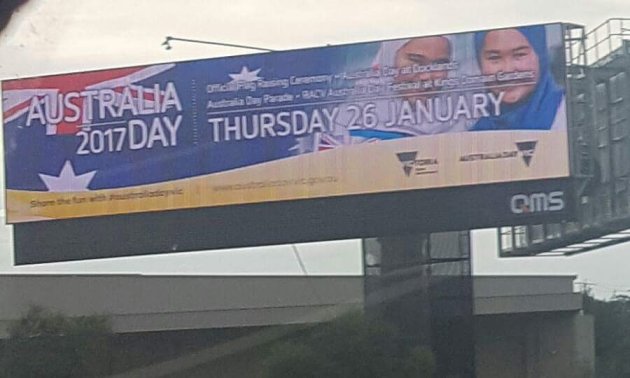
Advertisers and media owners need to stand up to the threat of racism and bigotry when it rears its ugly head in this country. And the best way to start is by improving the diversity we see in everyday creative, which in this country is sorely out of touch with the reality of how multicultural our society has become.
In the past few days, an outdoor digital advert in Melbourne received a backlash from a small minority of idiots who took offence to an image that depicted two Islamic Australian girls smiling next to an Australian flag.
The digital panel, promoting the RACV-sponsored Australia Day Festival in the Kings Domain Gardens, featured rolling images of people from various cultural backgrounds and had nothing to do with religion. But an image of two Muslims, predictably, had armchair warriors frothing at the mouth with outrage. The billboard has now been removed but a Go Fund Me campaign has raised more than $4,000 in an hour to have the billboard reinstated.

Thinly-veiled racism
On social media echo chambers, some argued the image was political correctness gone mad, because apparently any depiction of an Australian that doesn’t conform to lazy Caucasian stereotypes is pandering to a minority.
Others argued it was un-Australian because it didn’t feature the cliché drivel of BBQs, beaches, bikinis and sunshine, like those Tourism Australia ads of the 80s and 90s that we used to pitch to naïve Americans.
Others said the ad promoted one religion over others, and was another sign of Muslims forcing their way of life onto Australia. Some people use the anti-Muslim or anti-religion line to mask their racism against Arabs and Africans, gleefully pointing out "you can't be racist against a religion".
The anger began when several far-right groups, including the known islamophobes United Patriots Front, began spreading the image on social media, intentionally misleading people about the nature of the campaign and what it sought to represent.
This anger hit fever pitch yesterday when outdoor company QMS, which hosted the ad on its billboard, pulled it down after receiving threats that we can only hope are now being investigated by police.
The government’s response rightly called out those responsible that they need a refresher on what it means to be Australian.
Unfamiliarity fuels xenophobia
The fact that racists can so easily turn an innocent and unspectacular piece of creative into a calling card to spread their agenda of hatred and bigotry points to another problem with the way Australians are represented in the media and advertising.
A hijab wearing Australian should not be shocking or hijacked by right-wing extremists to promote bigotry, but it does so because it is unusual and can easily be twisted into ‘confronting’.
This contradicts who we are as a nation. Australia is one of the most successful multicultural societies on the planet, a true melting pot of immigrants, many who arrived by boat, and belief systems that mostly co-exist in harmony.
Granted, the country has a 'high level of low level racism', as Waleed Aly once noted, but it doesn’t suffer from some of the extreme examples of race-fuelled violence that can be found in parts of the US, UK and elsewhere.
Switch on your TV, however, and more often than not our popular culture is represented by Caucasians with a sprinkle of Asians every now and then. We may have ditched the White Australia policy decades ago but remnants still remain on TV and in advertising.
Last night, during an ad break I observed, every single piece of creative featured talent from a Caucasian background, mostly Anglo Saxon at that. This is hardly a fair representation of what you’d get in most urban centres these days.
The MLA Spring lamb ad that promoted multiculturalism in a tongue-in-cheek way was recently lauded at the Australian Multicultural Marketing Awards for challenging norms in advertising. While The Monkeys produced some great work and rightly received the accolades, part of the reason it stands out is because the status quo, in terms of cultural diversity, is sorely bland and predictable.
SBS, often a lone wolf in tackling this problem, is taking proactive steps to promote diversity in advertising through a competition.
Moving beyond 'token'
But isn’t it time advertisers and creatives took it upon themselves to place diversity at the heart of campaigns rather than as an afterthought or token gesture?
Surely businesses that willfully avoid representing our multicultural society in their marketing risk alienating large chunks of the market.
I hope this is the year in which diversity really takes off in advertising in a meaningful way, normalising all of the colour, culture and differences that makes this country so great.
Nobody should be shocked by hijabs, turbans, kippahs or other symbols of culture again, and advertising should play a lead role in helping to shift perceptions.


